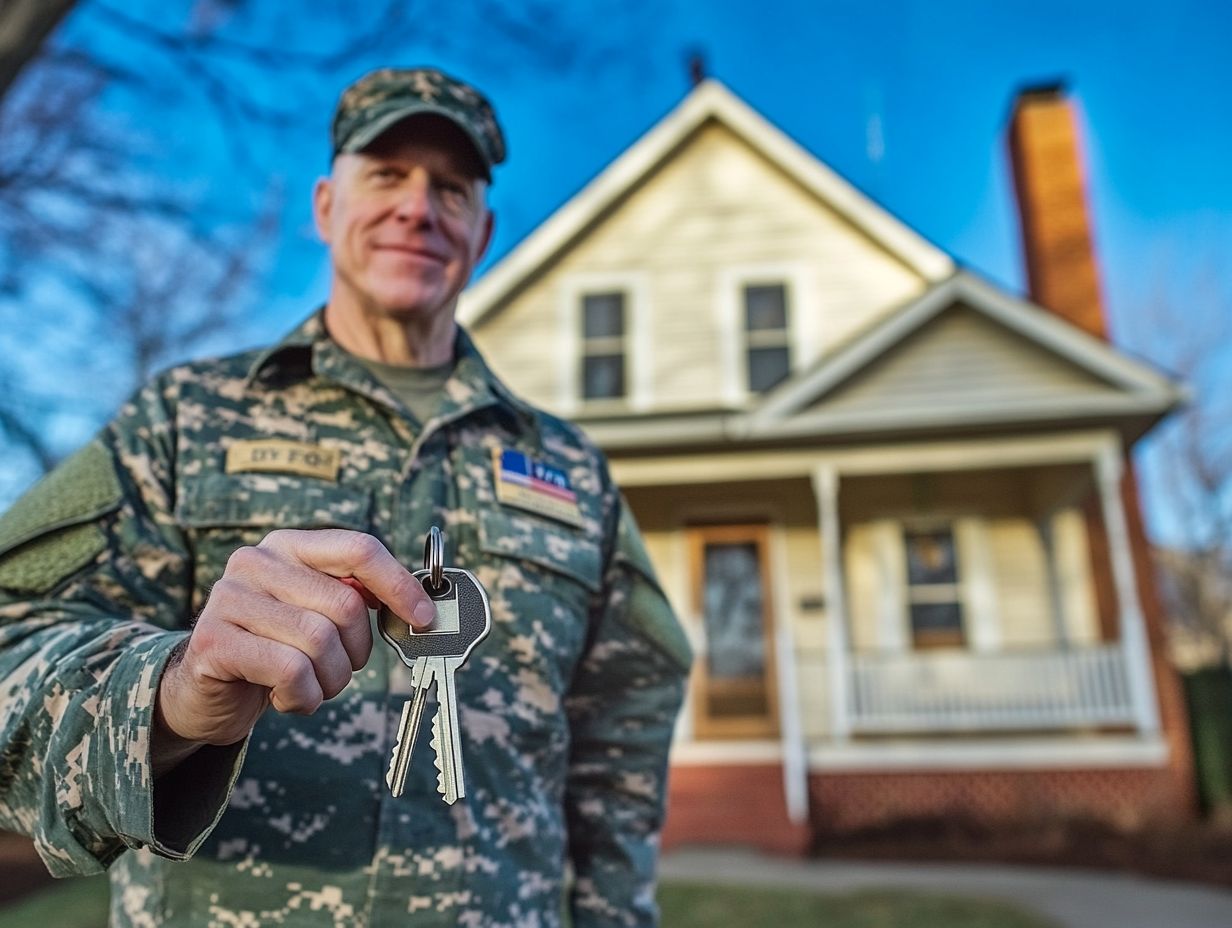What You Need to Know About VA Loans
VA loans represent a powerful financial tool specifically crafted to assist you, as a veteran or active-duty service member, in achieving your dream of homeownership.
With distinct eligibility criteria and benefits that often surpass those of traditional mortgages, grasping the nuances of VA loans can unlock unique opportunities for you.
This guide will detail the essential requirements, walk you through the step-by-step process of securing a loan, and dispel common misconceptions that may be hindering your progress.
It will also delve into alternatives for those who may not meet the qualifications for VA financing. Whether you re a veteran yourself or someone eager to support a veteran, this information is tailored for you.
Contents
Key Takeaways:
Here are some key points to remember about VA loans:

- VA loans are home loans available to eligible veterans, active duty members, and their spouses, offering unique benefits over traditional mortgages.
- To be eligible for a VA loan, one must meet specific requirements and qualifications set by the Department of Veterans Affairs.
- The VA loan process involves several steps, including obtaining a Certificate of Eligibility, finding a VA-approved lender, and meeting property and credit requirements.
What are VA Loans?
VA loans are tailored home financing options provided specifically for veterans, active-duty service members, and eligible surviving spouses by the Department of Veterans Affairs (VA). As a qualified individual, you can seize the opportunity to purchase a home without the burden of private mortgage insurance.
These loans often feature attractive terms, including competitive interest rates and the possibility of no down payment. By understanding the details of VA loans like the Certificate of Eligibility, which is a document that proves your service, and the funding fee you can make well-informed decisions about your journey to homeownership.
This government-backed financing option not only supports your dreams but also honors the sacrifices made by those who have served our nation.
Eligibility for VA Loans
To qualify for a VA loan, you must meet specific eligibility criteria set by the Department of Veterans Affairs. This includes having served on active duty, fulfilling minimum service requirements, or being a member of the National Guard or Reserve.
You also need a valid Certificate of Eligibility, confirming your service status and entitlements, even if you ve received a discharge upgrade.
Requirements and Qualifications
- You must possess a valid Certificate of Eligibility.
- Maintain acceptable credit scores.
- Ensure that the loan is specifically used for a primary residence not for investment properties or vacation homes.
To secure this Certificate, you’ll typically need to provide documentation such as your service records, discharge papers, and any necessary identification.
While the minimum credit score can vary, aiming for a score of at least 620 is generally advisable to enhance your eligibility chances. It’s essential to remember that VA loans are exclusively designed for primary residences, meaning you cannot use them to purchase rental properties or second homes.
The funding fee an upfront cost that varies based on factors such as your military service history can impact the total loan amount. While this fee can be rolled into the loan, it’s crucial for you to understand its implications on your overall costs and monthly payments.
Benefits of VA Loans

VA loans present a wealth of advantages that position them as an exceptional financing choice for veterans and active-duty service members.
With no requirement for mortgage insurance, competitive interest rates, and the opportunity to refinance with reduced closing costs, these loans are designed with your unique needs in mind.
This blend of benefits, along with tailored homeownership perks, enables you to secure your financial future while honoring your dedicated service to the country.
Don’t wait! Explore your VA loan options today!
Advantages Over Traditional Mortgages
VA loans offer you a range of advantages that set them apart from traditional mortgages. For instance, you can bypass private mortgage insurance, finance your closing costs, and enjoy lower overall borrowing costs thanks to competitive interest rates.
These benefits make VA loans particularly attractive for veterans and active service members eager to purchase a home. Unlike conventional loans, which usually require you to pay private mortgage insurance if your down payment is less than 20%, VA loans free you from this extra financial burden.
You also have the option to roll closing costs into the loan amount, which can significantly ease your upfront expenses and make homeownership more attainable. Plus, the funding fee tied to VA loans is typically lower than what many borrowers encounter with conventional mortgages, resulting in substantial savings.
This unique blend of benefits not only streamlines the buying process but also enhances affordability, allowing you to secure your dream home with much greater ease.
The VA Loan Process
The VA loan process can be remarkably straightforward if you understand the key steps involved.
- First, you’ll need to obtain a Certificate of Eligibility, which confirms your eligibility for the loan.
- Next, it’s important to select reputable private lenders who can guide you through the process.
- Prepare for any closing costs associated with the loan.
Each of these steps plays a crucial role in getting your home loan.
Step-by-Step Guide to Obtaining a VA Loan
Obtaining a VA loan is a refined process that unfolds in a structured manner, starting with your application for a Certificate of Eligibility and the selection of mortgage lenders tailored to your unique needs.
Once you’ve secured that Certificate, the next step is to carefully look into various lenders who specialize in VA loans. Their terms and rates can profoundly influence your financial landscape, making this phase crucial.
Be sure to ask questions! This will help you make an informed decision. After you’ve identified a suitable lender, it’s time to evaluate the closing costs, which encompass essential fees that can fluctuate significantly.
By comparing these costs across lenders, you stand to save money and gain a clearer picture of what to expect. Maintaining organized records and fostering open communication with your lender will expedite the process, ensuring you secure your home with efficiency and ease.
Common Misconceptions about VA Loans

Common misconceptions about VA loans can create confusion around their advantages and requirements. Many individuals mistakenly believe that these loans come with high mortgage insurance.
In reality, that s not the case; VA loans do not require mortgage insurance, though they do have a funding fee. Understanding this distinction can illuminate the true benefits of utilizing a VA loan.
Debunking Myths and Clarifying Facts
Debunking myths and clarifying facts about VA loans is crucial for you as a potential borrower, particularly when it comes to understanding the funding fee and the common misconception that mortgage insurance is mandatory.
These misunderstandings can block veterans from homeownership. While the funding fee might have a negative connotation, it actually plays a vital role in sustaining the VA loan program, ensuring that it remains a viable option for those who have served.
Unlike conventional loans, where mortgage insurance can lead to significant additional costs, you have the advantage of avoiding this expense altogether, which ultimately boosts your affordability.
Understanding these details helps you make smart choices about your financial future, instilling greater confidence as you explore your homeownership options.
Alternatives to VA Loans
For veterans and service members who might not qualify for a VA loan, numerous alternatives await. Options such as conventional loans, FHA loans, and a range of financing solutions from private lenders can effectively support your homeownership aspirations.
Explore your options today to find the best loan for your needs!
Other Types of Home Loans Available
Veterans and service members have several home loan options. These include conventional loans, FHA loans, and loans from private lenders.
Conventional loans usually require a higher credit score and a large down payment. They are great for people with good credit.
FHA loans help first-time buyers or those with lower credit scores. They have more flexible rules and lower down payment requirements. However, they come with mortgage insurance premiums that can raise your overall costs.
Private lenders offer flexible financing tailored to your needs. Explore customized solutions that fit your financial situation.
Whether you choose fixed or adjustable rates, these options provide valuable insights as you navigate home financing.
Frequently Asked Questions

What are VA loans?
VA loans are home loans backed by the US Department of Veterans Affairs. They help eligible veterans, active duty members, and certain surviving spouses buy homes.
What are the benefits of a VA loan?
VA loans have many benefits. These include no down payment, lower interest rates, and no need for private mortgage insurance.
Who is eligible for a VA loan?
Your eligibility for a VA loan depends on your military service. Generally, veterans who served at least 90 days during wartime or 181 days during peacetime qualify.
What types of properties can be purchased with a VA loan?
VA loans can be used to buy primary residences like single-family homes or condos. They can also be used to build or renovate a home.
How much can I borrow with a VA loan?
Your borrowing limit with a VA loan depends on your service history and where you live. Typically, the VA guarantees up to $417,000 in most areas, but this can vary.
Do I have to pay any fees for a VA loan?
While VA loans don’t require a down payment, there are still some fees. These may include a VA funding fee and appraisal costs. Some fees can be included in the loan or covered by the seller.





